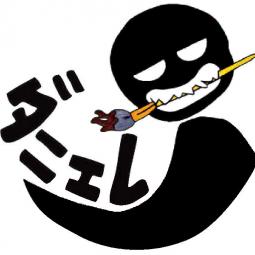Biography
From the self-portrait with the paint brush between his teeth to the little dogs in manga style, Daniele Frisina’s works, (born in 1980), capture your attention/the observer thanks to their immediacy which is never spontaneity but rather executive straightforwardness: every single detail, before being painted, is carefully and meticulously evaluated.
Pupil of Giuliana Bocconcello, from whom he inherited an expressive research which is emotionally authentic, Daniele is one of the best comics creators. He is not instinctive, but rather impeccable and perfectionist; he prepares minutely every single work, on paper, on computer, then on canvass.
But it’s to the colour that Daniele commits his most authentic and somewhat hidden emotions, even if it is fighting continuously against those thick black lines, which try to close, compress, and contain an emotional impulse which is authentic and passionate.
Once you see his works you will remember them: his small men iconically inexpressive, and yet tenderly melancholic, have wide open eyes but they don’t have a mouth, arms or legs because there is no chance for external communication. They are defined by that continuous thick, big, and black line which ensnares as a treacherous snake the strong colours, which are unwilling to yield their symbolic expressiveness. Daniele measures and evaluates meticulously the colours too (green is ambiguity, magenta warmth and goodness, yellow tension, blue absence) because nothing must be splattered on the canvass without a rigorous pre- selection.
It seems as if Daniele has engineered his own symbolic system, almost an aesthetic-expressive system of signals, irrefutable and reassuring as a traffic light (as in red stop, green go).
His work, apparently simple, is in fact complex, hermetically closed, leaving just little room for interpretation because he tries to check every single detail, from the smallest to the biggest. And who looks at it can just play along with his semantic code, respecting it.
(review by Silvia Sfrecola Romani – translation by Francesca Magnoni)






